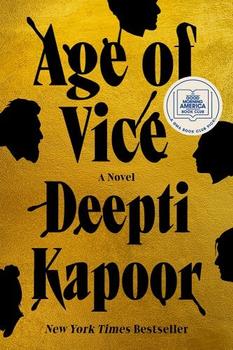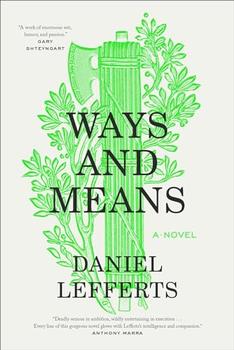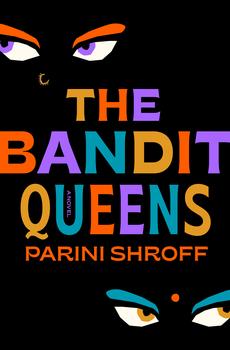Summary | Excerpt | Reading Guide | Reviews | Beyond the book | Read-Alikes | Genres & Themes | Author Bio

A Novel
by Deepti KapoorDeepti Kapoor’s novel Age of Vice is a literary crime thriller set in northern India during the early years of the 21st century. The Wadia Syndicate, headed by brothers Bunty and Vicky, controls a vast and extremely lucrative empire that encompasses all trade in the region — legal and otherwise. Sunny, Bunty’s only child, is the heir apparent to this criminal enterprise. A dissolute, self-indulgent playboy in his 20s, he draws people into his lavish lifestyle, first indulging and then callously discarding them as he grows bored. Among those who care about Sunny in spite of his thoughtlessness are his loyal servant, Ajay, and Neda, his part-time lover.
Although the book unfolds in three parts, told first from Ajay’s perspective, then Neda’s, and finally Sunny’s own point of view, in reality it’s all about Sunny. Kapoor paints him with incredible nuance, and the shifting perceptions among the three help create an exceptionally complex character. This level of character-building, even for secondary characters, is remarkable; Bunty, for example, is rarely mentioned and his appearances in the novel are brief, yet his shadow perpetually hangs over his son, influencing nearly every aspect of Sunny’s life. Sunny simultaneously wants to defy his father and win his approval, creating a tense dynamic at the novel's very core. Kapoor’s other characters are also fascinating, with Ajay in particular eliciting reader’s sympathies.
Kapoor’s writing is extraordinary; I was especially impressed by her use of multiple styles, all of which are honed to perfection. Most of her prose is straightforward, but lyrical moments abound: ("She removed the shawl, the coat, held them over her lap with the helmet, soaking in the hot wind, closing her eyes and giving herself over to the sweep of the road. She was happy being lost."). Some of the most violent passages are relayed with a clinical coldness, while other intense moments are written as verses of poetry:
Something is hardening. Hardening in him.
He buries all his past.
Buries his kindness.
Finds a new way to live each day.
And finally, the last few chapters of the book read with the propulsion and pace of a screenplay, where scenes shift with kaleidoscopic rapidity as the action revs up.
The narrative is primarily character-driven, but the Wadia Syndicate’s underhanded business tactics drive the action. As one might expect from a story about a criminal mob, the novel contains quite a lot of violence, some of it graphic. In addition, Sunny’s lifestyle largely revolves around sex, drugs and alcohol, so readers should expect explicit scenes of substance abuse.
At over 550 pages, this is a hefty book, but for the most part I found it compelling and hard to put down. The center section — Neda’s story — dragged a little, but not so much that I was bored; it just didn’t fly by as quickly as the rest of the novel. My only real quibble with the book is that it ended too soon; while the plot did hit a resolution of sorts, none of the main characters’ stories reached a conclusion, and a new, highly intriguing character was introduced late in the novel. Fortunately, Age of Vice is the first entry in a planned trilogy, so the lack of a tidy ending leaves ample room for the sequels.
The novel has appeared on many "Most Anticipated Books" lists, and its screen rights sparked a record-setting bidding war. Publishers Weekly calls it "deeply addictive" and Booklist states it's "a dizzying ride" — and I agree with those reviewers; it’s one of the most complex, well-written, well-conceived novels I’ve encountered in a long time. I highly recommend Age of Vice to adult audiences interested in top-notch literary fiction.
![]() This review was originally published in The BookBrowse Review in January 2023, and has been updated for the
January 2024 edition.
Click here to go to this issue.
This review was originally published in The BookBrowse Review in January 2023, and has been updated for the
January 2024 edition.
Click here to go to this issue.

If you liked Age of Vice, try these:

by Daniel Lefferts
Published 2024
A searing debut novel about a striving finance student, the line between ambition and greed, and the disordered politics of our era.

by Parini Shroff
Published 2024
A young Indian woman finds the false rumors that she killed her husband surprisingly useful—until other women in the village start asking for her help getting rid of their own husbands—in this razor-sharp debut.
Your guide toexceptional books
BookBrowse seeks out and recommends the best in contemporary fiction and nonfiction—books that not only engage and entertain but also deepen our understanding of ourselves and the world around us.